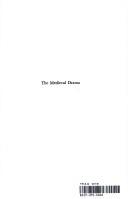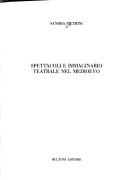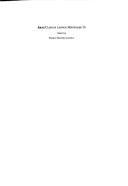| Listing 1 - 10 of 281 | << page >> |
Sort by
|

ISBN: 0873950852 9780873950855 Year: 1973 Publisher: Albany (N.Y.): State university of New York press,
Abstract | Keywords | Export | Availability | Bookmark
 Loading...
Loading...Choose an application
- Reference Manager
- EndNote
- RefWorks (Direct export to RefWorks)

ISBN: 8883195906 9788883195907 Year: 2001 Publisher: Roma: Bulzoni,
Abstract | Keywords | Export | Availability | Bookmark
 Loading...
Loading...Choose an application
- Reference Manager
- EndNote
- RefWorks (Direct export to RefWorks)
Book
Year: 1985 Publisher: Leuven, Belgium : Leuven University Press,
Abstract | Keywords | Export | Availability | Bookmark
 Loading...
Loading...Choose an application
- Reference Manager
- EndNote
- RefWorks (Direct export to RefWorks)
The present volume offers a collection of studies intended to give an overall picture of the International Colloquium on Medieval Theatre organized by the Instituut voor Middeleeuwse Studies of the Katholieke Universiteit Leuven. The reader will probably remark upon the fact that studies on medieval drama are as flourishing and diversified as their object itself once was. From liturgical drama to pageant, from nativity play to mystery, from latin comedy to 'sottie', morality and farce, one discovers here the various aspects of an output that covers more than five centuries. This selection hopefully represents a cross-section of contemporary work in the field. As methods evolve and ways of reading change, the subject reveals itself as something for ever old and new. Thus a number of contributors emphasize a formal approach. Both the analysis of a dramatic production as a structured entity--from the larger viewpoint of scenic organization right down to the level of verse or even rime--and as an actual performance, continue to shed valuable light on the theatrical event in its generic and historical context.
Drama, Medieval. --- Drama, Medieval --- History and criticism.
Book
Year: 1985 Publisher: Leuven, Belgium : Leuven University Press,
Abstract | Keywords | Export | Availability | Bookmark
 Loading...
Loading...Choose an application
- Reference Manager
- EndNote
- RefWorks (Direct export to RefWorks)
The present volume offers a collection of studies intended to give an overall picture of the International Colloquium on Medieval Theatre organized by the Instituut voor Middeleeuwse Studies of the Katholieke Universiteit Leuven. The reader will probably remark upon the fact that studies on medieval drama are as flourishing and diversified as their object itself once was. From liturgical drama to pageant, from nativity play to mystery, from latin comedy to 'sottie', morality and farce, one discovers here the various aspects of an output that covers more than five centuries. This selection hopefully represents a cross-section of contemporary work in the field. As methods evolve and ways of reading change, the subject reveals itself as something for ever old and new. Thus a number of contributors emphasize a formal approach. Both the analysis of a dramatic production as a structured entity--from the larger viewpoint of scenic organization right down to the level of verse or even rime--and as an actual performance, continue to shed valuable light on the theatrical event in its generic and historical context.
Drama, Medieval. --- Drama, Medieval --- History and criticism.
Book
ISBN: 900464718X Year: 1997 Publisher: Amsterdam : BRILL,
Abstract | Keywords | Export | Availability | Bookmark
 Loading...
Loading...Choose an application
- Reference Manager
- EndNote
- RefWorks (Direct export to RefWorks)
Between Folk and Liturgy, the title of this collection, should not be understood to refer to some fixed point, some stable place between the two extremes of an illiterate and a literate culture. Rather, the title flags the wide and colourful spectrum of medieval dramatic possibility. Perhaps except one, none of the ten essays published here deal with a drama existing purely at either end of this scale. They add to our impression of the teaming fecundity and hybridism of early European drama, an impression that grows apace once we start to consider dramas situated Between Folk and Liturgy. The geographical terrain that the essays traverse ranges from the British Isles in the west to Poland in the east. The suppleness of the approaches taken here is the minimum critical requirement of anyone wanting to do justice to so complex and multifold a phenomenon as is early European drama.
Drama, Medieval. --- Drama, Medieval --- History and criticism.
Book
Year: 1985 Publisher: Leuven, Belgium : Leuven University Press,
Abstract | Keywords | Export | Availability | Bookmark
 Loading...
Loading...Choose an application
- Reference Manager
- EndNote
- RefWorks (Direct export to RefWorks)
The present volume offers a collection of studies intended to give an overall picture of the International Colloquium on Medieval Theatre organized by the Instituut voor Middeleeuwse Studies of the Katholieke Universiteit Leuven. The reader will probably remark upon the fact that studies on medieval drama are as flourishing and diversified as their object itself once was. From liturgical drama to pageant, from nativity play to mystery, from latin comedy to 'sottie', morality and farce, one discovers here the various aspects of an output that covers more than five centuries. This selection hopefully represents a cross-section of contemporary work in the field. As methods evolve and ways of reading change, the subject reveals itself as something for ever old and new. Thus a number of contributors emphasize a formal approach. Both the analysis of a dramatic production as a structured entity--from the larger viewpoint of scenic organization right down to the level of verse or even rime--and as an actual performance, continue to shed valuable light on the theatrical event in its generic and historical context.
Drama, Medieval. --- Drama, Medieval --- History and criticism.
Book
Year: 1954 Publisher: Berkeley (Calif.) : University of California press,
Abstract | Keywords | Export | Availability | Bookmark
 Loading...
Loading...Choose an application
- Reference Manager
- EndNote
- RefWorks (Direct export to RefWorks)
Book
Year: 1954 Publisher: Berkeley : University of California Press,
Abstract | Keywords | Export | Availability | Bookmark
 Loading...
Loading...Choose an application
- Reference Manager
- EndNote
- RefWorks (Direct export to RefWorks)
Book
ISBN: 2868782310 9782868782311 Year: 2005 Volume: 54 Publisher: Orléans: Paradigme,
Abstract | Keywords | Export | Availability | Bookmark
 Loading...
Loading...Choose an application
- Reference Manager
- EndNote
- RefWorks (Direct export to RefWorks)
« Mainte belle œuvre faicte » : sous ce titre qui exprime magnifiquement leur admiration et leur gratitude, les meilleurs spécialistes du théâtre médiéval rendent hommage à un maître. Leurs contributions abordent tous les aspects de la scène médiévale : – conditions de la représentation ; – transmission et tradition des œuvres au travers de l’Europe ; – éléments matériels et effets spéciaux dans la mise en scène ; – typologie et spécificité des genres littéraires ; – enjeux politiques et théologiques des mystères ; – réception du jeu dramatique en France et dans toute l’Europe. Ces trente études attestent du rayonnement de Graham Runnalls et de ses travaux sur l’état présent de la recherche. Contributions de : Jean-Pierre Bordier, Marie Bouhaïk-Gironès, Philip Butterworth, Robert Clark, Alain Corbellari, Véronique Dominguez, Estelle Doudet, Pascale Dumont, Élyse Dupras, Gérard Gros, Vicki L. Hamblin, Alan Hindley, Denis Hüe, Alan E. Knight, Jelle Koopmans, Lenke Kovács, Élisabeth Lalou, Xavier Leroux, Mario Longtin, Francesc Massip, Charles Mazouer, Silvère Menegaldo, Peter Meredith, Lynette Muir, Richard Rastall, K. Janet Ritch, Michel Rousse, Bruno Roy, Jean Subrenat, Claude Thiry.
Drama, Medieval --- History and criticism --- Drama, Medieval - History and criticism

ISBN: 9788446015352 8446015358 Year: 2001 Publisher: Madrid: Akal,
Abstract | Keywords | Export | Availability | Bookmark
 Loading...
Loading...Choose an application
- Reference Manager
- EndNote
- RefWorks (Direct export to RefWorks)
| Listing 1 - 10 of 281 | << page >> |
Sort by
|

 Search
Search Feedback
Feedback About UniCat
About UniCat  Help
Help News
News